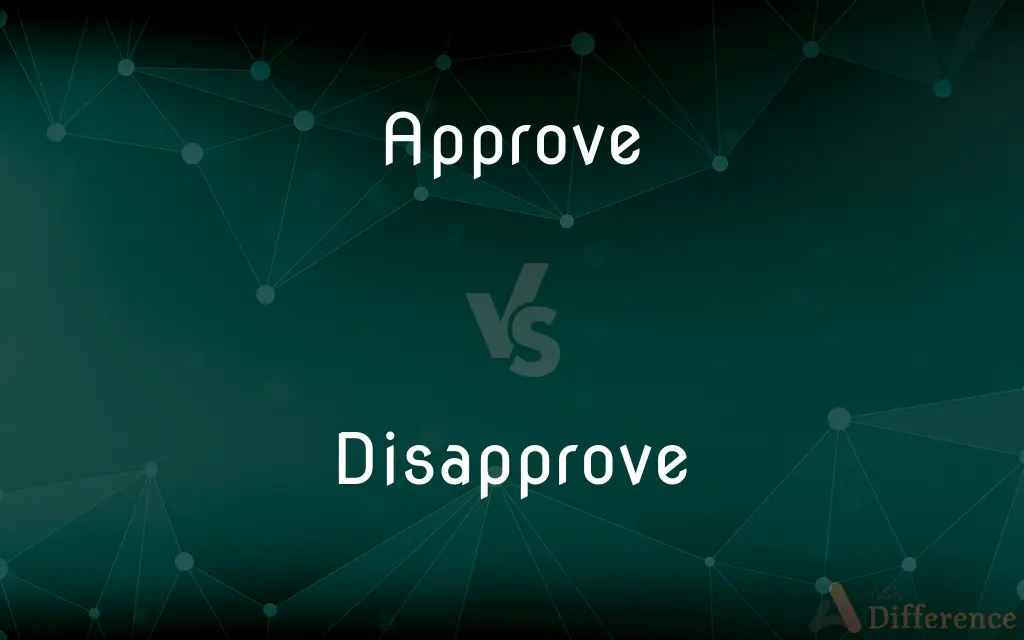Approve vs. Disapprove — What's the Difference?
By Tayyaba Rehman — Updated on October 29, 2023
"Approve" means to accept or agree favorably, showing consent. "Disapprove" means to reject or express dissatisfaction, indicating non-consent. They are opposites: one conveys agreement, the other disagreement.

Difference Between Approve and Disapprove
Table of Contents
ADVERTISEMENT
Key Differences
"Approve" and "Disapprove" are terms that represent contrasting reactions or opinions regarding a particular matter or situation. When one says they "approve" of something, they are expressing a favorable opinion or acceptance of that specific thing. This could be based on personal taste, moral judgment, or a set of criteria. On the other hand, to "disapprove" means to have an unfavorable opinion or to reject that particular thing, suggesting a level of dissatisfaction or disagreement.
In practical terms, "approve" often suggests a formal or informal consent. For instance, a manager might approve an employee's vacation request, signifying that they agree with and allow the request. Conversely, "disapprove" would signify that the manager does not agree with or allow the request. Such terms are frequently used in bureaucratic or organizational contexts where permissions and consents are pivotal.
Interestingly, "approve" and "disapprove" can also convey personal sentiments, beyond just formal permissions. For example, one might approve of a friend's choice in fashion, signaling a personal liking. In contrast, one might disapprove of a certain behavior, indicating personal disagreement or dissatisfaction. Here, the terms go beyond mere formalities and reflect deeper personal beliefs and emotions.
Culturally, the act to approve or disapprove can be significant. Social norms and values often dictate what is broadly approved or disapproved of within a society. Individuals often seek approval and fear disapproval, as these reactions can greatly influence one's social standing and self-perception. Thus, while "approve" and "disapprove" may seem like simple reactions, they can hold profound significance in various contexts.
Comparison Chart
Definition
Accept or agree favorably
Reject or express dissatisfaction
ADVERTISEMENT
Indication
Consent
Non-consent
Usage
Often related to permissions
Typically denotes denial or disagreement
Emotional Undertone
Positive, accepting
Negative, rejecting
Influence by
Personal taste, moral judgment, set criteria
Personal disagreement, societal norms
Compare with Definitions
Approve
To accept as satisfactory.
The principal approved the new school curriculum.
Disapprove
To reject as unsatisfactory.
The editor disapproved the initial draft.
Approve
To speak or think favorably of.
I approve of your dedication to the project.
Disapprove
To express moral or ethical judgment against.
Some religions disapprove certain behaviors.
Approve
To consider right or good.
Many people approve the mayor's decisions.
Disapprove
To withhold approval from.
The committee disapproved the plan due to safety concerns.
Approve
To authorize or permit.
The board approved the budget for next year.
Disapprove
To regard with displeasure or reluctance.
I disapprove of the way he handled the situation.
Approve
To consent to officially or formally; confirm or sanction
The Senate approved the treaty.
Disapprove
To have an unfavorable opinion.
Parents often disapprove of excessive video gaming.
Approve
To consider right or good
"He came to ask me ... whether I approved his choice altogether" (Jane Austen).
Disapprove
To have an unfavorable opinion of; condemn.
Approve
(Obsolete)To prove or attest.
Disapprove
To refuse to approve; reject.
Approve
To show, feel, or express approval
We didn't approve of the decision.
Disapprove
To have an unfavorable opinion
Disapproves of drinking.
Approve
(transitive) To officially sanction; to ratify; to confirm; to set as satisfactory.
Although we may disagree with it, we must nevertheless approve the sentence handed down by the court-martial.
Disapprove
(intransitive) To condemn; to consider wrong or inappropriate; used with of.
She disapproves of rap music because of its sometimes aggressive lyrics.
Approve
(transitive) To regard as good; to commend; to be pleased with; to think well of.
We approve the measure of the administration, for it is an excellent decision.
Disapprove
To have or express an unfavorable opinion. en transitive or not? merge with sense 1: same thing?
Approve
To make proof of; to demonstrate; to prove or show practically.
Disapprove
(transitive) To refuse to approve; reject.
Approve
To consider worthy (to); to be pleased (with); to accept.
Her mother never approves of any of her boyfriends. She thinks nobody is good enough for her little girl.
Disapprove
To pass unfavorable judgment upon; to condemn by an act of the judgment; to regard as wrong, unsuitable, or inexpedient; to censure; as, to disapprove the conduct of others.
Approve
To show to be worthy; to demonstrate the merits of.
Disapprove
To refuse official approbation to; to disallow; to decline to sanction; as, the sentence of the court-martial was disapproved by the commander in chief.
Approve
To make profit of; to convert to one's own profit — said especially of waste or common land appropriated by the lord of the manor.
Disapprove
Consider bad or wrong
Approve
To show to be real or true; to prove.
Wouldst thou approve thy constancy? ApproveFirst thy obedience.
Disapprove
Deem wrong or inappropriate;
I disapprove of her child rearing methods
Approve
To make proof of; to demonstrate; to prove or show practically.
Opportunities to approve . . . worth.
He had approved himself a great warrior.
'T is an old lesson; Time approves it true.
His account . . . approves him a man of thought.
Approve
To sanction officially; to ratify; to confirm; as, to approve the decision of a court-martial.
Approve
To regard as good; to commend; to be pleased with; to think well of; as, we approve the measured of the administration.
Approve
To make or show to be worthy of approbation or acceptance.
The first care and concern must be to approve himself to God.
They had not approved of the deposition of James.
They approved of the political institutions.
Approve
To make profit of; to convert to one's own profit; - said esp. of waste or common land appropriated by the lord of the manor.
Approve
Give sanction to;
I approve of his educational policies
Approve
Judge to be right or commendable; think well of
Approve
To confirm or sanction formally.
The committee approved the research proposal.
Common Curiosities
Can these terms be used in informal contexts?
Yes, both can denote personal opinions or feelings, not just formal permissions.
Can you "approve" of something but still "dislike" it?
Yes, one might approve of something for its practicality but personally dislike it.
Can an organization "disapprove" of something?
Yes, organizations can disapprove based on their values, rules, or standards.
Is "disapproval" always negative?
While it indicates disagreement, it might be constructive or based on positive intentions.
Is "disapprove" stronger than "dislike"?
"Disapprove" often carries a moral or ethical judgment, while "dislike" is more about personal taste.
Are "approve" and "disapprove" direct antonyms?
Yes, they are opposites; "approve" conveys agreement, while "disapprove" conveys disagreement.
Is "approval" always explicit?
Not necessarily. Approval can be implied through actions or non-verbal cues.
Can one "approve" of someone as a person?
Yes, it means one has a favorable view of that individual's character or behavior.
Can "disapprove" be used without moral implications?
Yes, it can also indicate simple disagreement or dissatisfaction.
How does society influence what we approve or disapprove of?
Societal norms and values can shape our perceptions of what's acceptable or unacceptable.
Is seeking approval a universal human trait?
Many people seek approval for social or psychological reasons, but the degree can vary among individuals.
Is "disapproving" the same as "prohibiting"?
Not always. One can disapprove without taking action to prevent, while "prohibit" means to actively forbid.
How are these terms used in bureaucracy?
"Approve" often means giving permission, while "disapprove" means denying it.
Can "approve" and "endorse" be used interchangeably?
They're similar, but "endorse" often means publicly supporting, while "approve" can be private or public.
Is "self-approval" a term?
Yes, it refers to an individual's positive self-evaluation or self-acceptance.
Share Your Discovery

Previous Comparison
Practice vs. Process
Next Comparison
Lecturership vs. LectureshipAuthor Spotlight
Written by
Tayyaba RehmanTayyaba Rehman is a distinguished writer, currently serving as a primary contributor to askdifference.com. As a researcher in semantics and etymology, Tayyaba's passion for the complexity of languages and their distinctions has found a perfect home on the platform. Tayyaba delves into the intricacies of language, distinguishing between commonly confused words and phrases, thereby providing clarity for readers worldwide.















































